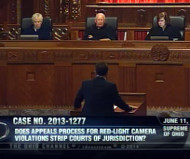2/19/2015
Ohio Supreme Court Makes Pro Traffic Cameras Ruling FinalThe Supreme Court of Ohio rejected an attempt to reconsider the decision it handed down to rescue automated enforcement from legal challenge.

The Ohio Supreme Court is done listening to arguments about red light cameras and speed cameras. A narrow majority on Wednesday denied reconsideration of the December ruling that rescued cities with photo ticketing programs. The court saw no problem with cities creating their own judicial panels to adjudicate tickets without the permission of the General Assembly. (view ruling).
December's ruling said that it did not matter that the state constitution only gave the legislature the authority to create judicial panels because cities have been labeling the citations as "civil" matters so that fewer rights apply. For the past four years, Bradley L. Walker has been fighting the $120 ticket issued to him by Redflex Traffic Systems of Australia on behalf of Toledo. That ticket became final Wednesday, as the high court majority was not persuaded by Walker's plea for a second chance.
"The [constitutional] policy is that if you are in this state and one of the municipalities charges you with wrongdoing, there is a conflict of interest for the municipality to pick and choose who will decide your case," Walker's attorney, Andrew R. Mayle, wrote to the court. "So the matter is left to the legislature. To not reconsider, this court must be comfortable with the notion that Ohioans submitted to every city council in this state the unilateral, constitutional power to preemptively vest a local political appointee with exclusive original jurisdiction over alleged ordinance violations."
Walker's attorney added that the Ohio General Assembly went so far as to enact a law in December (view law), erroneously reported by local press as a "ban" on automated enforcement, to authorize the Toledo-style tribunal. Walker's attorney insisted that the Supreme Court's decision rendered the legislature's act useless.
"If the majority doesn't reconsider, any municipality may negate a municipal court's original jurisdiction for any ordinance carrying a financial penalty," Mayle argued.
Redflex said Mayle and Walker's arguments were nothing new and that the Supreme Court could only consider facts that were not known at the time of the decision.
"Walker's motion is nothing more than a restatement of the same arguments in new packaging, and as such, should be denied," the Australian firm's lawyers insisted. "It is this court -- not the legislature -- that determines what a statute says."
In the end, four of the justices sided with Redflex; three sided with Walker.


